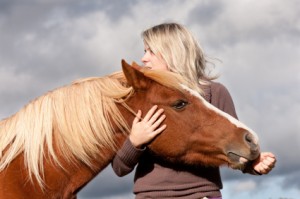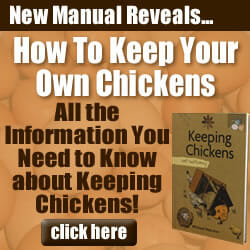If you are among those who have chosen an off-the-grid lifestyle, you know that growing and raising your own food is one of the best ways to maintain independent living. Taking care of farm animals requires a lot of work and is a big responsibility, however, and that responsibility can grow significantly if you are facing a natural disaster situation or other kind of emergency. No one who is raising cattle, pigs, chickens, sheep, or any other type of farm animal can afford to be caught unprepared when calamity strikes. Because we live in dangerous times, it is very important to be ready for all contingencies, including those that might endanger the lives of your farm animals and the health of your farming operation.
Making a Plan
 In case of emergency, animals may need to be moved, and they may need to be moved quickly. Because of the complexity and sheer amount of work involved in such an undertaking, it is important to have all the logistics planned out ahead of time so that things will go smoothly if an evacuation or relocation should become necessary at some point. If disaster should come, you will be under a lot of pressure, and there will be a lot of things that need to be taken care of in a short period of time, making prior preparation and rehearsal of all contingencies absolutely essential.
In case of emergency, animals may need to be moved, and they may need to be moved quickly. Because of the complexity and sheer amount of work involved in such an undertaking, it is important to have all the logistics planned out ahead of time so that things will go smoothly if an evacuation or relocation should become necessary at some point. If disaster should come, you will be under a lot of pressure, and there will be a lot of things that need to be taken care of in a short period of time, making prior preparation and rehearsal of all contingencies absolutely essential.
Planning for emergencies should include input and participation from family, friends, and neighbors. Any kind of network of mutual aid and support you can set up with people you know you can trust will be a big help if an emergency situation should arise. Copies of your plan should be drawn up and posted at different spots on your homestead for easy viewing, and copies should also be distributed to everyone who is a part of your network of mutual support.
Making Arrangements
Moving farm animals will take supplies and transportation, so you will need to have the former on hand and arrangements made for the latter if you don’t personally own the vehicles you will need. In a panic situation such as a fire, flood, tornado, or earthquake, animals are certain to have an emotional reaction to what is happening, so you will need to have devices for restraint available that are appropriate for the types of animals you keep. With respect to transportation, you will need to have phone numbers close by so you can contact the people who will be renting or loaning you trailers and trucks at a moment’s notice.
It will also be necessary to make arrangements so that you have places to take your animals if they someday need to be evacuated. This could include locations like fairgrounds, racetracks, other farms, or neighbors’ pasture lands. Relocation of animals on their home ground may also be possible – if you have suitable pastureland available, you could take them there until the emergency situation passes. If your preference is to keep your farm animals onsite, then you need to make sure your pastureland is safe. For example, if you are in a flood zone, your land will need to be higher than the rest of the farm. To be safe from wildfire, the pastureland should be free of vegetation around its borders. In case of high winds from tornadoes or hurricanes, there shouldn’t be any wooden buildings or loose large items around that could harm your animals if the items get thrown around or broken into pieces. There should also be no power lines or support poles nearby.
There are some basic items that could be critical to your efforts to keep your animals safe before, during, and after any emergency. Some of these important supplies include:
- An animal first aid kit
- Ear tags, neckbands, and markers for making animal IDs
- A current list of all your animals plus their health records
- Large water containers
- Ladders, hose, and rope
- Extensive supplies of animal feed
- Flashlights and lanterns
In addition to cages, halters, blindfolds, lead ropes, and other supplies that are needed to help move animals, it is also important to have things that can help you manage all of the complexities and moment-by-moment situations that may arise during an emergency.
Prevention
There are certainly things that can be done to protect yourself and your animals against the potential danger and devastation of a natural disaster or other emergency. The areas around barns and other buildings that house animals should be free of surrounding trees, bushes, or other foliage that might burn in the case of wildfire. It would also not be a bad idea to create firebreaks a little farther out from the buildings. Overhanging branches should also be eliminated, and buildings with animals should always have clear, roomy pathways leading in and out. Extra feed supplies should be kept in waterproof containers, in elevated places well protected from the weather. Any time a building that holds animals is in need of any repairs, those repairs should be performed thoroughly and without delay.
Preparing Your Animals Means Preparing Yourself
While having a well-thought out plan to handle an emergency is important, being mentally prepared for the challenge of an emergency situation is even more vital. When disaster strikes and your world seems to be falling apart around you, being able to remain calm, cool, and collected is what will make the difference. If you have things planned in advance, then it will be much easier to act swiftly and decisively if that dreadful day finally comes.
To make sure everyone is truly prepared, it is a good idea to hold mock-emergency drills ahead of time. Actually acting out how you and your family and support network will handle things in a crisis is an excellent way to prepare everyone mentally for future calamity.
Panic in the face of disaster is the result of improper planning, and there is only one way to eliminate this situation: plan properly! If you do, when disaster comes you will perform efficiently and effectively – and if they could speak, your farm animals would thank you for it.
© 2011 Off the Grid News
 Off The Grid News Better Ideas For Off The Grid Living
Off The Grid News Better Ideas For Off The Grid Living




